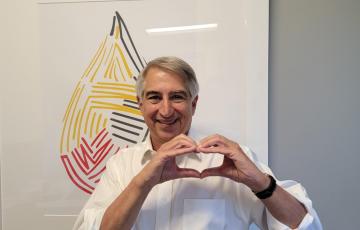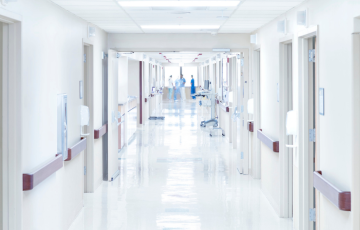Search Results
What I’ve Learned: Tips for Parents of Kids with ALL
My daughter Mackenzie was diagnosed with acute lymphoblastic leukemia (ALL) in January 2014. Despite being the most common form of childhood cancer that has a very prescribed protocol with better-than-most survival rates, the diagnosis petrified me. My nine-year-old had cancer.
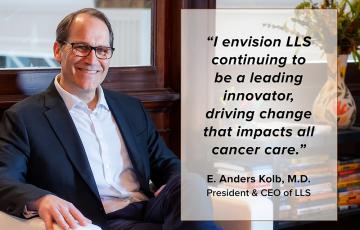
MY FIRST 100 DAYS AS LLS PRESIDENT & CEO
Dear Friends,
I’m just over 100 days into my new role as President & CEO of The Leukemia & Lymphoma Society (LLS) and I want to take this moment to say how grateful and proud I am to work alongside all of you in service of blood cancer patients and their families. It’s been great meeting many of you as I travel to our regions and meet with departments throughout the country. And I look forward to meeting many more of you in the months ahead.
Identification and characterization of genetic factors affecting MLL/KMT2A fusion proteins stability in MLL/KMT2A rearranged leukemias
MLL1/KMT2A rearranged leukemias are the most common blood cancer occurring in children characterized by dismal prognosis. Given the importance of fusion proteins in driving the disease, I will determine factors affecting the fusion protein stability through a CRISPR/Cas9 screening approach in an innovative model system where the MLL fusions are endogenously tagged with a fluorescent protein. This will facilitate development of molecular glue degraders specifically targeting the MLL fusions.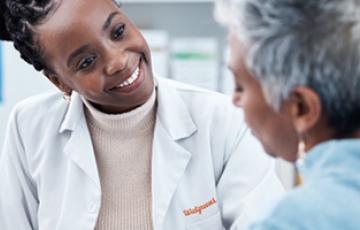
Shop Online and In-Store at Walgreens to Support LLS
The Leukemia & Lymphoma Society (LLS) and Walgreens are in your corner.
Since 2019, Walgreens has helped to raise more than $30 million for LLS and Susan G. Komen, all with a clear goal in mind: to advance research for tough-to-treat cancers and increase equitable access to care.
Where Blood Cancer Meets Nature: Why This Scholarship Recipient Is Saving the Earth
When we think about the future, a lot can feel uncertain—especially as a teenager or young adult (AYA) with blood cancer.
We get it.

Volunteers: The Engine Powering LLS’s Mission
I was always aware that volunteers with The Leukemia & Lymphoma Society (LLS) drive impact for blood cancer patients and families. But it wasn’t until Thanksgiving Day 2007 that I discovered the full force of their power. My wife, Holly, had recently been diagnosed with follicular lymphoma and our family was still reeling from the news. She was feeling quite ill, and we were exhausted with worry and trying to keep life as normal as possible for our two young children.
Mitoxantrone
Mitoxantrone is FDA approved in combination with other approved drug(s) indicated in the initial therapy of acute nonlymphocytic leukemia (ANLL) in adults. Mitoxantrone is a dark blue solution that may cause urine to appear blue-green. It may also cause the whites of the eyes to turn a blue color. These effects are normal and last for only 1 or 2 days after each dose is given. This medicine often causes a temporary loss of hair. After treatment with mitoxantrone has ended, normal hair growth should return.
Omacetaxine mepesuccinate
Omacetaxine mepesuccinate is FDA approved for the treatment of adult patients with chronic or accelerated phase chronic myeloid leukemia (CML) with resistance and/or intolerance to two or more tyrosine kinase inhibitors (TKI).
The effectiveness of omacetaxine mepesuccinate was evaluated using a combined group of patients whose cancer progressed after previous treatment with two or more TKIs. All participants were treated with omacetaxine mepesuccinate.
Vinblastine
Vinblastine is an FDA-approved chemotherapy agent that is used to treat people who have acute leukemia. It is sometimes used to treat other types of cancer including lymphoma.
Bendamustine hydrochloride
Bendamustine hydrochloride is FDA approved to treat people who have:
- Chronic lymphocytic leukemia (CLL). Efficacy relative to first line therapies other than chlorambucil has not been established.
- Indolent B-cell non-Hodgkin lymphoma (NHL) that has progressed during or within six months of treatment with rituximab or a rituximab-containing regimen.
Inotuzumab Ozogamicin
Inotuzumab ozogamicin is FDA approved for the treatment of relapsed or refractory CD22-positive B-cell precursor acute lymphoblastic leukemia (ALL) in adult and pediatric patients 1 year and older.
Acalabrutinib
Acalabrutinib is a kinase inhibitor indicated:
- In combination with bendamustine and rituximab for the treatment of adult patients with previously untreated mantle cell lymphoma (MCL) who are ineligible for autologous hematopoietic stem cell transplantation (HSCT).
- For the treatment of adult patients with MCL who have received at least one prior therapy.
- For the treatment of adult patients with chronic lymphocytic leukemia (CLL) or small lymphocytic lymphoma (SLL).
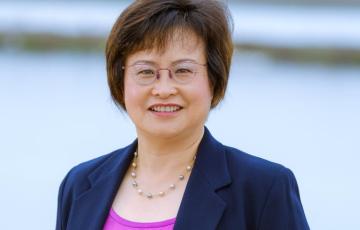
Meet the Researcher: Charlene Liao, PhD
Our “Meet the Researcher” series on The LLS Blog shares what our outstanding LLS-funded researchers are working on, the incredible impact they’re making in the fight against blood cancers, and what inspires their efforts to find better treatments and cures.
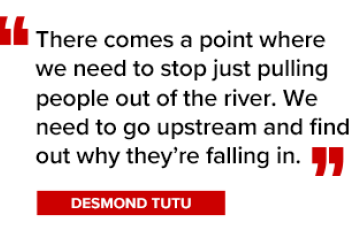
Improving Blood Cancer Survival Takes More than New Drug Discovery
In my years as a practicing hematologist-oncologist and now as chief medical officer of The Leukemia & Lymphoma Society (LLS), I’ve met many blood cancer patients who worry about how they’ll afford their treatment on top of day-to-day expenses like rent and groceries. LLS offers financial assistance for qualifying blood cancer patients and families
How Celebrating My 18th Birthday in the Hospital Changed My Perspective
Marlee’s story of courage, inspiration and giving back.
My name is Marlee Pincus and I have cancer. I never in a million years thought I would say those words. Growing up, I never had any medical issues nor a significant family history of cancer. In high school I loved to run, advocate for human rights, and learn Spanish. However, my greatest focus was always on my academics. I graduated Salutatorian of my class and was eager to begin my freshman year at Cornell University.
